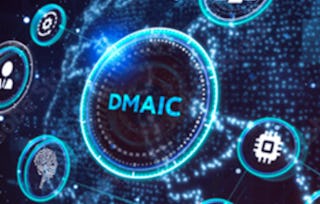The course is designed for Lean Six Sigma professionals to excel in the American Society for Quality (ASQ) Certified Six Sigma Green Belt (CSSGB) exam. The course focuses specifically on the first two phases of the define, measure, analyze, improve, and control (DMAIC) framework. In the define phase, you will learn to define a problem statement and project scope, whereas in the measure phase, you will learn about effective data collection strategies and measurement system analysis (MSA).

The DMAIC Framework - Define and Measure Phase

The DMAIC Framework - Define and Measure Phase
This course is part of ASQ-Certified Six Sigma Green Belt (CSSGB) Exam Prep Specialization


Instructors: Jaswant Singh Verma
Included with
10 reviews
Recommended experience
What you'll learn
Define specific, measurable, achievable, relevant, and time-bound (SMART) project goals and objectives.
Analyze the voice of the customer (VOC) data to translate it to critical to quality (CTQ) parameters.
Explain process mapping and define key performance metrics.
Plan data collection activities to quantify the performance of the process.
Skills you'll gain
- Performance Measurement
- Statistical Analysis
- Process Capability
- Quality Control
- Process Improvement
- Process Mapping
- Project Management
- Project Planning
- Six Sigma Methodology
- Quality Management
- Data Analysis
- Project Scoping
- Customer experience improvement
- Statistics
- Work Breakdown Structure
- Data Collection
- Lean Six Sigma
- Skills section collapsed. Showing 9 of 17 skills.
Details to know

Add to your LinkedIn profile
See how employees at top companies are mastering in-demand skills

Build your subject-matter expertise
- Learn new concepts from industry experts
- Gain a foundational understanding of a subject or tool
- Develop job-relevant skills with hands-on projects
- Earn a shareable career certificate

There are 5 modules in this course
In this module, you will learn the essential foundations for project initiation. The focus is on project identification, understanding the voice of the customer (VoC), and grasping fundamental project management principles. You’ll discover how to select projects effectively, comprehend customer needs through the VoC, and the basics of project management. You’ll also learn about project selection processes, process components, benchmarking concepts, and stakeholder analysis. The module also delves into VoC data collection, how to translate it into critical to quality (CTQ) factors, applying the KANO model, crafting project charters, defining project scopes, and tracking key project metrics. Finally, this module is your gateway to understanding project commencement and customer-centric project initiation.
What's included
8 videos2 readings4 assignments1 discussion prompt
In this module, you will learn about the fundamental tools crucial for effective project planning. You will gain insight into the work breakdown structure (WBS), Gantt charts, critical path method (CPM), and program evaluation and review technique (PERT. Additionally, the module discusses project documentation essentials, elements of project risk analysis, management and planning tools, and strengths, weaknesses, opportunities, and threats (SWOT) analysis. You will also learn about the benefits of decision matrices, quality metrics such as DPU, DPO, DPMO, Sigma level, and cost of poor quality. Finally, the module explores stages of team evolution, role management, and decision-making aids and offers a comprehensive insight into essential techniques vital for successful project management and planning.
What's included
8 videos1 reading4 assignments1 discussion prompt
In this module, you will focus on important statistical concepts and data-gathering techniques. You will learn about process analysis, probability basics, and various statistical distributions like normal, binomial, and Poisson. You will also gain insight into different data types, planning data collection, sampling methods, and operational definition worksheets. Next, the module delves into measures of central tendency and dispersion, and graphical representation. You will be introduced to statistical ideas such as probability, diverse data types, and effective data collection strategies, empowering you to summarize, analyze, and interpret data confidently in project scenarios.
What's included
9 videos1 reading4 assignments1 discussion prompt
In this module, you will gain insight into measurement system analysis (MSA), which is an in-depth evaluation of a measurement process to assess the quality and reliability of measurement systems used in data collection. You will also learn to evaluate and improve the existing measurement systems in a process or organization, identify sources of measurement error, assess measurement system performance, and implement strategies to enhance measurement accuracy and precision. Finally, this module also focuses on evaluating and assessing the performance and capability of a process to meet customer requirements and specifications.
What's included
4 videos2 readings3 assignments1 discussion prompt
This is a peer-review assignment based on the concepts taught in The DMAIC Framework: Define and Measure Phase course. In this assignment, you will be able to explain how to apply the define and measure phases of the DMAIC framework in a real-life scenario.
What's included
1 video2 readings1 peer review
Earn a career certificate
Add this credential to your LinkedIn profile, resume, or CV. Share it on social media and in your performance review.
Instructors


Offered by
Explore more from Data Analysis
 Status: Free Trial
Status: Free Trial Status: Free Trial
Status: Free TrialSimplilearn
 Status: Free Trial
Status: Free TrialKennesaw State University
 Status: Free Trial
Status: Free Trial
Why people choose Coursera for their career

Felipe M.

Jennifer J.

Larry W.

Chaitanya A.

Open new doors with Coursera Plus
Unlimited access to 10,000+ world-class courses, hands-on projects, and job-ready certificate programs - all included in your subscription
Advance your career with an online degree
Earn a degree from world-class universities - 100% online
Join over 3,400 global companies that choose Coursera for Business
Upskill your employees to excel in the digital economy
Frequently asked questions
To access the course materials, assignments and to earn a Certificate, you will need to purchase the Certificate experience when you enroll in a course. You can try a Free Trial instead, or apply for Financial Aid. The course may offer 'Full Course, No Certificate' instead. This option lets you see all course materials, submit required assessments, and get a final grade. This also means that you will not be able to purchase a Certificate experience.
When you enroll in the course, you get access to all of the courses in the Specialization, and you earn a certificate when you complete the work. Your electronic Certificate will be added to your Accomplishments page - from there, you can print your Certificate or add it to your LinkedIn profile.
Yes. In select learning programs, you can apply for financial aid or a scholarship if you can’t afford the enrollment fee. If fin aid or scholarship is available for your learning program selection, you’ll find a link to apply on the description page.
More questions
Financial aid available,
¹ Some assignments in this course are AI-graded. For these assignments, your data will be used in accordance with Coursera's Privacy Notice.

